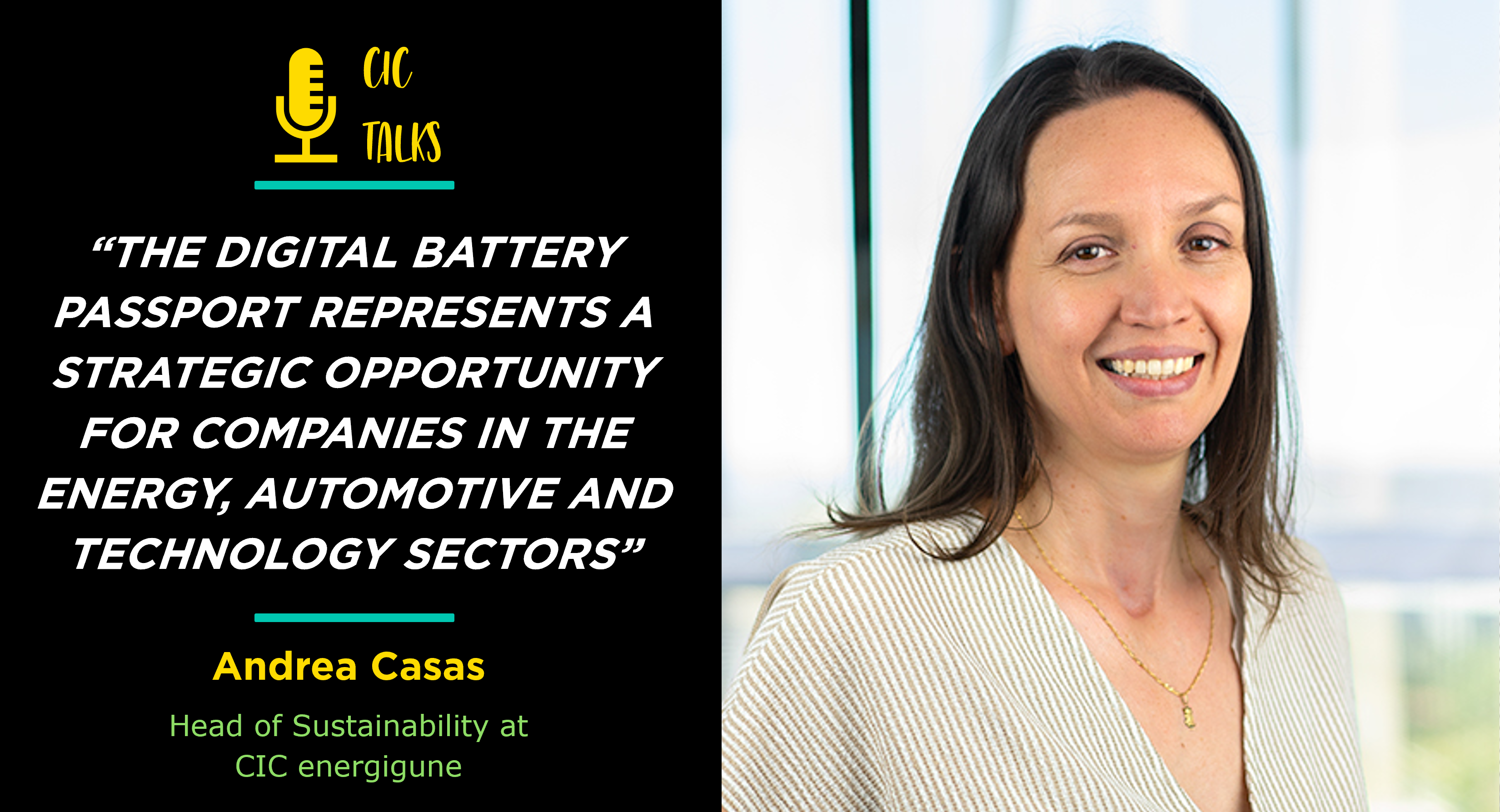
Andrea Casas, head of sustainability at CIC energiGUNE, reflects on the role of the Digital Battery Passport as a key lever to move towards a more traceable and circular energy storage model, aligned with the new European regulation.

The Digital Battery Passport is a key tool driven by the new European Battery Regulation (EU 2023/1542). It is a mandatory digital document that collects all relevant information about a battery throughout its life cycle, from its design and manufacture to its use, maintenance, reuse and recycling. This information includes, among other data, the product´s carbon footprint, the origin of the materials, the critical components it contains, its technical performance and its recycled content.
The aim is to ensure the traceability, transparency and sustainability of batteries marketed in Europe, especially those intended for electric vehicles, industrial applications or stationary storage. This passport will be accessible via a QR code visible on the product or its packaging.
The Digital Battery Passport represents a strategic opportunity for companies in the energy, automotive and technology sectors. First, it provides a competitive advantage by transparently demonstrating a commitment to sustainability and the circular economy, which is increasingly valued by consumers, regulators and investors.
Secondly, it facilitates regulatory compliance with new EU requirements for carbon footprint, recycled content and material traceability. Companies that implement passport-compliant systems from now on will be better prepared to adapt to legal deadlines and avoid penalties or market barriers.
Finally, the passport also helps to optimise operational efficiency by integrating usage, performance and maintenance data that can be used to improve product quality, extend product life, facilitate second life or simplify end-of-life recycling processes.
The implementation of the Digital Battery Passport will be mandatory as of 18 February 2027 for industrial, electric vehicle (EV) and light-duty transport batteries with a capacity of more than 2 kWh, which are placed on the EU market. This measure is part of the European Battery Regulation (EU 2023/1542), in force since 2024, which replaces the previous directive and sets new, higher standards for the sustainability of the sector.
It will mainly affect sectors such as automotive (electric car manufacturers), energy (storage system suppliers), consumer electronics, chemical industry (cell and electrolyte producers) and waste management and recycling. It will also impact the entire associated value chain, including raw material suppliers, logistics, software and certification companies.
In this context, the Digital Passport is not an isolated measure, but part of a broader trend towards digitisation and decarbonisation of the energy sector. Alongside the development of more sustainable batteries, the use of digital tools such as blockchain, digital twins and traceability platforms that ensure access to accurate information throughout the product lifecycle is being actively promoted.
The drive towards the circular economy is also reinforced, with regulatory targets requiring minimum levels of recycled content and high percentages of recovery of critical materials. The reuse of batteries in secondary applications, such as stationary storage of renewable energy, is also a growing practice.
In addition, a convergence between sustainability and cost-effectiveness is expected, where data collected through the passport will allow for more accurate and strategic decision-oriented life cycle cost (LCC) and environmental assessment (LCA) analyses.
Europe is at the forefront of creating a regulatory framework that promotes responsible battery manufacturing, with the Digital Passport as one of its key regulatory innovations. Through the new battery regulation, obligations are placed on all actors in the value chain - from raw material producers to recyclers - to share data and ensure compliance with environmental, social and governance (ESG) requirements.
This policy is complemented by initiatives such as the European Critical Raw Materials Strategy, which seeks to ensure the secure and sustainable supply of strategic materials such as lithium, cobalt or nickel. Progressive recycling targets are also set, which will require a minimum recovery of 50-80% of certain materials from 2026 and 2030, depending on the type of battery.
The ultimate goal is to position Europe as a global leader in sustainable battery manufacturing, fostering a green, digital and resilient industry.
CIC energiGUNE is actively working on the development of sustainable solutions for energy storage, applying methodologies such as LCA and LCC that will be fundamental to feed the data required by the Digital Battery Passport. Its expertise in life cycle analysis allows it to assess the carbon footprint, material composition and environmental impact of batteries from their design to the end of their useful life.
In addition, the centre participates in European projects linked to sustainability, traceability and standardisation, and collaborates in the creation of technical frameworks compatible with the new European regulations. With its technological know-how and focus on the circular economy, CIC energiGUNE can be a key partner for companies that need to adapt to passport requirements, validate their products or develop batteries more aligned with EU regulatory objectives.

If you want to know the latest trends in energy storage and new developments in research, subscribe.

If you want to join a top-level team, collaborate with specialists in multiple disciplines or tell us about your concerns, don't think twice...